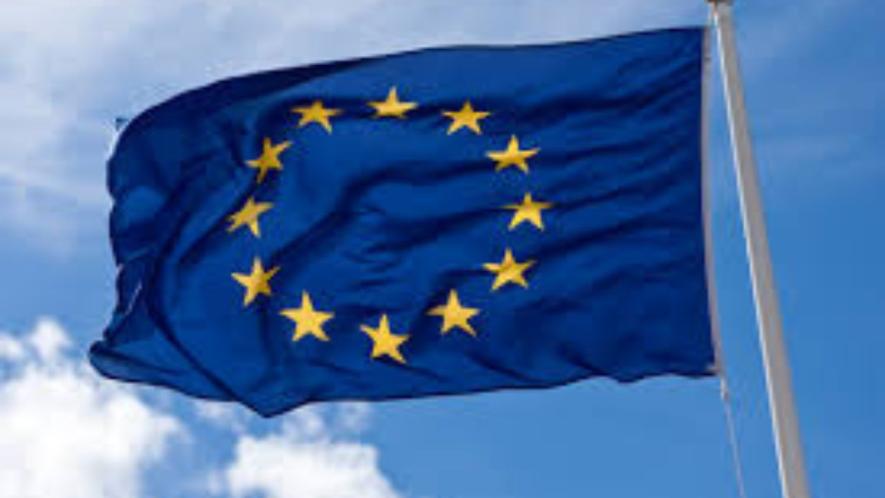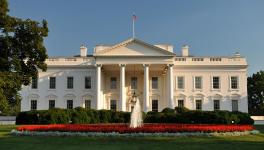Europe’s Crisis May Break Open Its Society

Image Courtesy: Wikimedia Commons
Over the past few weeks, Europe is being forced to face the consequences of the near-sightedness and ideological mirage that over a generation of its leaders suffered from and believed in. The consequences are proving to be lethal and have the potential to stoke a long-term decline of the continent.
On February 18, US Secretary of State Marco Rubio, and Russian Foreign Minister Sergei Lavrov met in Saudi Arabia to broker a peace deal for the war in Ukraine, to signal US’ exit from it, and all of this without European or Ukrainian representation. Additionally, Trump demanded of mineral resources worth $5oo billion as ‘compensation’ for aid to Ukraine.
This bilateral deal has left the EU in a free-fall; it did not expect a turnaround as drastic as this, and it has no conception of the path ahead. The US was by far the biggest donor of military and finance to Ukraine, and can only have a competitor if we take the EU as a whole – despite the war occurring right at the EU doorstep. To continue the flow of resources to Ukraine at the same pace, therefore, requires a doubling of the EU’s effort.
A primary bedrock of the European political psyche over the past seven to eight decades was the existence of the Trans-Atlantic alliance since the end of World War 2. This Alliance existed militarily in the form of NATO (North Atlantic Treaty Organisation), and economically through various fora – be it through the distribution of powers within International Monetary Fund and World Bank, or the existence of OECD (Organisation for Economic Co-operation and Development), or through fora such as G7 (Group of Seven) of the same countries, which strived for a neocolonial and undemocratic ‘rules-based global order’.
What is essential to understand is that this relationship began as an attempt at the reconstruction of Europe after the Second World War, which was totally battered and hence required assistance and long-term association with the new-found emperor of the capitalist world, the United States.
The US proposed the following deal to Europe: the US shall provide for European security costs by contributing more than its necessary share in NATO, and will also provide a market to some of the European industries without any, or with negligible tariffs. In return, Europe will coalesce behind the US in its imperial adventures, will respect the primacy of the US dollar, and will remain a reliable political, military ally of the US.
The US has also ensured that Europe’s domestic politics remains amenable and loyal to US interests, and never pivots toward a call for socialism, or even renewed sovereignty. In fact, the primary objective behind the formation of NATO and the Bretton Woods – as the post-war arrangement is called – was of ‘containment’ of communism and of deterring any socialist, or USSR- (Union of Soviet Socialist Republics) allied movement in Europe. Therefore, the reconstruction of Europe with the aid of the US was also a measure to deter the European masses, whose lives had been destroyed by capitalist crisis and imperial war, from getting attracted to socialism.
The situation did not change much with the fall of the USSR. NATO had no role to play now, but it continued to raze into the Eastern European region, paying no heed to Russia’s grievances. Therefore, Europe’s dependence on the US for its military needs persisted, but its economic dependence further deepened. Already dependent on the US for investments and financing its early capital formation in the 1950s, the US has also always remained the biggest market for European goods. This only increased with the coming of neoliberalism, and the global shift toward export-driven manufacturing, primarily oriented towards the US market.
However, the coming of the Euro currency (and, by extension, the EU) marked a decisive subservience of the European countries to the dictates of financialisation that the US wished to impose across the world. Initially, a concept by an American professor Thomas Mundell, the Euro was designed as a mechanism to grab away the monetary independence of the European countries and hence the ability of the nations to incur fiscal deficits, by centralising the currency in Brussels, which formed a transatlantic alliance with the US to financialise the world and implement anti-people policies.
The powerlessness of the euro can be summed up from the reason behind the beginning of the war on Iraq: it is said that the primary cause for invasion of the country was that Iraq’s ruler Saddam Hussein had begun to trade the country’s oil in euros, which the US perceived as a fundamental threat to itself. The US responded with as heavy a hand as possible against Hussein for the crime of moving away from dollars to the currency of its ‘ally’.
Since neoliberalism, therefore, the EU has further sacrificed its sovereignty to the US. The Big Tech of the US -- to which Europe has no match – has no respect for European laws, nor for any of the laws that have attempted to tax their businesses in the EU. Big Tech has helped the US surveil European political leaders.
The EU has also obediently followed the US in each of its imperial actions, and in recent times, in blocking its own access to advanced technologies from China, be it 5G from Huawei or the immensely cheap EV (electric vehicle) cars that the US forced EU to sanction, which has effectively ensured that Europe remains a protected market for US and European cars, and especially for Tesla, owned by Elon Musk.
Donald Trump, nevertheless, marks an almost permanent rupture in this alliance of ex-colonial countries. European political leaders wish to continue a relationship that, if Trump is successful, will become history. Trump simply sees the transatlantic alliance and the American contribution to it as unsustainable and ‘unfair’. This alliance, however, has been the bedrock of the post-Second World War European society, and hence, this break will bring lasting changes to the continent.
Pitilessly, Trump is reverting to a strategy of diplomacy that had been the US’ basic understanding until the Bretton Woods system – and that is of breaking organised opposition, of individually fleecing nations, and dictating its own terms to nations that have no individual power against it. His disdain for multilateral institutions stems from the supposed clarity that there is a greater potential to remain transactional under bilateral relationships, and multilateralism will inevitably lead to responsibilities for the US and ‘concessions’ for others.
What kind of Europe will emerge now? It does not seem clear. Germany, the largest European economy as well as the only country with any significant industry, has had negative growth rates in the past two years. Prices of basic essentials, such as oil, electricity and food have skyrocketed and real wages have plummeted. The situation has been nearly similar in France, as well as the United Kingdom.
Europe has been forced (physically, by damaging the Nord Stream 2 pipeline, and diplomatically) by the US to sacrifice the value chain that was the foundation of European prosperity: cheap Russian oil and gas for German industry has been replaced by US oil that is at least three times as expensive. Many observers have, in fact, argued that this was one of the primary motivation for sanctioning Russia – the German industry has become unsustainable, which has now begun to leave the country for the US.
Any semblance of military independence of Europe would necessarily mean a far greater military expenditure by European nations, and the present ‘sweet deal’ of the EU providing social services to its citizens while the US takes care of military expenditure seems very unlikely to continue.
EU, unfortunately, seems enthusiastic to warmonger against Russia, and this would necessitate a militarisation of Europe. The allies of Trump and Musk in Europe, the Far-Right sections, such as Germany’s AfD, France’s Marine Le Pen, Italy’s Giorgia Meloni and UK’s Reform Party are cut from the same cloth as their American counterparts. The Far-Right have a twin agenda of extreme austerity and anti-immigration. Trump plans to shut down state services, such as education, health, and reduce corporate taxation to bare minimum. A demonisation of immigrants and a revival of the ‘native West’ seems to be the social agenda that the parties seem determined to implement.
The corporate class seems increasingly aligned to this political agenda and sees it as a viable option in the present crisis of liberal politics. An ultranationalism and anti-EU sentiment may well be good for the US, who can push the pieces of Europe against one another to further bring them to submission.
For the European people, however, this will surely be a yet another compounding of the crisis that they already face – the past few years are evidence that the fundamental contradictions at the core of this alliance are coming to the fore, simultaneously with the increased and overt political interference by the US in the continent.
An independent economic path by the EU requires an autonomous political leadership that is not fleecing the European people in the interests of the US, and that can only be possible with a united Europe that is in favour of an alternative to neoliberalism, that dares to see its interests more aligned with the Global South and less with the US Empire.
The dominant countries of the EU need to realise that the policies of austerity and neoliberalism that the EU and US together forced upon the Global South for many decades, are finally going to come home if there is no transformation: in fact, Southern European countries like Greece were already condemned to financial crises and declining living standards from the fallout of the Great Financial Crisis of the US and the resulting Eurozone crisis. The US, now, intends to force its closest allies to decline.
The crisis of neoliberalism, exacerbated by COVID-19, has continued unabated and has now engulfed much of Europe. Trump’s recent actions are only the final act of pulling the proverbial carpet from under Europe’s feet.
Ananya Kumar is a student at International Development Economics Associates (IDEAs). The views are personal. He can be reached at anany.kumar.19@gmail.com.
Get the latest reports & analysis with people's perspective on Protests, movements & deep analytical videos, discussions of the current affairs in your Telegram app. Subscribe to NewsClick's Telegram channel & get Real-Time updates on stories, as they get published on our website.
























